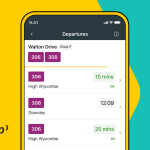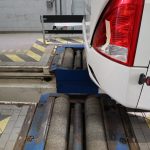The last time we spoke to Passenger Plus, the company was in its infancy, albeit a very successful one. Four years later, it continues to go from strength to strength. Beth Hutson visits to discuss the last four years with Managing Director Mark Drury
It’s been a busy four years for joint Directors Mark Drury and Kevin Hughes of Passenger Plus. From its inception in 2012, where 11 vehicles were bought outright with no part exchange, the company has steadily grown, acquiring more clients, staff and vehicles, along with accreditations from CoachMarque and BUSK, and two Route One Awards along the way.
Passenger Plus seems naturally geared towards the corporate environment – 80% of the work Passenger Plus do is B2B, much for other coach operators who have benefitted from their location between Gatwick and Heathrow, and just 12 miles from central London. The fleet is immaculately turned out, and as Mark explains, running the newest possible vehicles is an important part of the business model, with all but four vehicles in the fleet ready for Euro 6.
Today, Mark tells me that the fleet consists of ’20 PCVs and some 8 seaters, and in 2016 the company grew by £500,000 – pushing its annual turnover to £2 million. What was once 15 staff is now 38 – but it’s not all change at Passenger Plus.
“The company is now four times bigger in turnover terms than it was in 2013. Vehicle-wise, we’ve basically doubled the size of the fleet, with plans for more,” he explains. “Our business model is, as it was back then, very much around providing services for corporate clients who predominately don’t have enough car parking space – that’s normally where we can add value, not just with shuttlebus services, but with train discounts, car share schemes and a range of green travel solutions. A consultancy service which formulates and reports on company travel plans is also offered which allows a client’s complete sustainable travel responsibilities to be taken care of.
The right people at the right time
While the Passenger Plus workforce has grown, Mark tells me that getting the right members of staff is a constant challenge for the company.
“We’ve learnt from the growing pains of the last four years. It’s almost always about getting the right people in the right positions all the time. We’re constantly interviewing and trying to take people on. It’s a big issue for us,” he says. “Where we’re located, it’s an extremely expensive place to live, and it’s quite hard work getting the people that we want.”
The corporate environment comes with its own set of challenges for drivers, and Mark explains how this can make finding the right people even harder.
“Our clients are used to the same level of service that you get with a chauffeur, and a chauffeur will always get out and open the door, and we expect our employees to do that as a matter of course,” he tells me. “It’s not anything that most decent drivers wouldn’t do, but we need to do that every single time – even if it’s chucking it down with rain, our driver has to greet our clients with an umbrella, and a smile! When new people come to us, depending where they come from, that’s the sort of thing that we have to spend quite a lot of time on at the beginning.”
Understanding the needs of the workforce is important to Mark, and he tells me that the money aspect of the job plays only a part in what his employees want. “We came to the realisation that if we want the right people, we have to start thinking about what they actually want – and it’s not all about money,” he says. “We cant’ keep paying people more, so what else can we do to make it nice to work here? To a degree, it almost feels like you’re selling the job to a driver when they come for an interview. But if you look after your employees, they hopefully stay. Instilling a sense of pride is key.”
A growing client base
The last few years for the company have been transformative, and 2016 in particular, where the company saw a growth of £500,000, has been a period of change. “We were successful in winning three sizable contracts, and the company grew by about £500,000 worth of turnover. It’s jumped really quickly.” says Mark. The success has not been without it’s challenges though, as Mark explains how the growth has highlighted the need to ‘start putting a few more management layers in place’ to deal with the increasing demand.
When we last spoke to Passenger Plus, green travel was often an important consideration for their clients – and for many of them this remains the same. “For all corporates, sustainability is important,” he says. “We excel in delivering the service our clients need at an affordable cost. With Euro 6 we can demonstrate our low emission credentials and prove this by recording and reporting the CO2 emissions for our vehicles from our tracking software. As a company we like measurable and tangible results, and we find our clients appreciate hard facts when it comes to green travel.”
While the core business of corporate shuttle services remains key to the company, other revenue streams have been exploited to keep this most modern of fleets working outside of the traditional business working week. Cruise terminal transfers are one such example, with the work dovetailing with the demands of contract customers. Pharmaceutical, financial services and motor industry PR companies, feature prominently in the impressive client list, but as Mark points out ‘we have a very good grasp of our costs, so we will consider any work, as long as it pays’
Changing with technology
Keeping up-to-date with and utilising technology in order to better the experience of both the clients and the Passenger Plus workforce is incredibly important to the company. At the Surrey depot, Mark shows me the online employee resource centre, and explains how all employees must go through the company’s policies and procedures thoroughly when they first join, electronically signing each document once read and understood.
Mark also walks me through Wufoo – an online form generator, introduced to him by another operator, which Passenger Plus uses for job applications, vehicle type training and post-incident report forms.
“When something doesn’t go quite right, we sit the driver down and complete an online form, where we highlight how much an incident actually costs, including downtime, delivery to the repair centre and any reputational damage” he says.
And it seems to be making a difference – in the first six months of 2014 the amount spent on own-fault damage was £8000, which dropped to just £200 the following six months after this system was put into place. “We’ve found this really useful. When we started doing this and sitting down with drivers and actually making them culpable for what they’ve done, very quickly it changed.” Mark explains.
While Passenger Plus aims to be as tech-savvy as possible, Mark says that recognising when something just doesn’t work is important.
“We’ve spent some time on some things that have been a waste of time – for example trying to get remote digital tachograph downloads via our tracking system, and it just didn’t work,” he tells me. “As with tracking, all vehicles have CCTV, but we’ve got two or three vehicles where we have remote live view so we can see images in real time, either on-line or on our smartphones. We thought this might be something we want to roll out across the whole fleet, but it doesn’t work well enough, and we still end up downloading the vehicle hard drives. We’ve learnt that some things don’t work, and we’ve not been afraid to say ‘that’s not working for us, lets stop doing it’.”
Looking to the future
There’s no time for complacency, and Mark doesn’t intend to rest on his laurels. There’s plenty in the works over the next year, including plans to increase their licence.
“We are very active with bidding on contracts and we’ve got another couple on the go at the moment. We’re going to need to increase our licence, so that’s something for us to do this year,” says Mark.
“We have a menu of proven, core services that our clients are able to pick from, including a comprehensive online reporting suite that allows clients to see how their service is performing in real time, against key performance indicators. This level of detail, available 24/7 is becoming something that most corporate clients expect, and we can tailor our offering to suit their wants and needs.
Mark says that his eye is on Euro 6, which he feels will work in favour for the modern Passenger Plus fleet. “We invested nearly three quarters of a million pounds last year replacing our 2012 Sprinters up to Euro 6 and expanding the fleet – we’ve got our eye on two or three years’ time. We’ve got to be ahead of the game. We always buy new, getting the most favourable warranty and R&M terms we can, enabling us to operate a nearly new fleet with fixed costs.”
The bottom line for both Mark and Kevin continues to be turning a profit while meeting the needs of their clients in an effective and efficient way.
“We had a 5 year plan which we are delighted to say we are well ahead of, so we have just re-worked our 10 year plan based on performance so far.
We have a strong, scalable brand, and we will continue to grow organically, and, if the right opportunity arises by acquisition.
“You couldn’t be in this industry if you didn’t love it, but there’s no romance for us in running coaches. We are very proud of what we do, and aim to offer an industry leading service, but we’re a business, and we’re here to make money.”






















